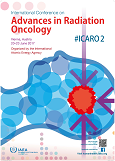Speaker
Kamaran A. Mohammad
(Zhianawa Cancer Center)
Description
Background:
Breast cancer (BC) is the most common cancer in Iraqi ladies and the need for the adjuvant (Adj) Radio-Therapy (RT) as part of the breast cancer treatment, is important in many of the cases. RT centers are few in this war-torn country (10 in total) and they are over-loaded with the cancer patients and under-equipped with the required machines and staff (16 functioning linear accelerators in total for around 35 million of population while the ideal requirement is around 70 machines, ie, less than 23% of the requirement). Subsequently, most of the patients have to wait for long time reaching to eight months in our center in order to get the treatment, and few are being able to travel abroad to seek the required care in-time.
The standard Adj. RT in BC is ranging from 40 Gray (Gy) / 15 fractions (fr) / 3 weeks (wk) as in the British institutions, to 50 Gy / 25 fr / 5 wk as in the American institutions. The practice of short-course adj. RT in BC (5 fr, once a day, over one week or once a week over five weeks, to a total of 26 - 30 Gy) has been studied previously by some colleagues and was a reasonable option in general, this is beside the extensive studies in Accelerated Partial Breast Irradiation approaches via brachytherapy or external beam radiotherapy.
By mid of 2016, we launched a short course protocol in breast RT and we would like to share our modest knowledge here, as we feel that its feasibility outcomes can be of interest to some colleagues in RT community who are facing similar challenges.
Methods:
Descriptive report of the patients who received Adj. RT for BC, in a dose of 27 Gy in 5 daily fr., in Zhianawa Cancer Center (ZCC). Field of radiation was either whole breast or chest wall, with or without regional nodes with an additional boost as indicated. Tolerability of this study was assessed by checking the willingness of the participants to be managed in this approach. The trial design is a single arm feasibility study. Primary end point was the percentage of patients receiving the full course of treatment as planned. We assumed that more than 80% [CI: 60-80] of the participants will tolerate and complete the full course. We estimate that we will have 0.9 power to demonstrate the feasibility using 45 number of patients. The protocol concept of the study was discussed at / and accepted by the ASCO International Clinical Trials Workshop (ICTW) in Istanbul, May 7-8, 2016 and we started to recruit patients after that.
Results:
20 ladies with a mean age of 51 year (range 27-79) were managed according to this study for curative adj. intention during the period of June to early November 2016 (the remaining 25 required patients will be collected in the coming months till the time of the ICARO in June 2017). Half of them underwent breast conserving surgery (BCS) and the other half with modified radical mastectomy (MRM). 90% with invasive ductal carcinoma (IDC) and 50% with grade II and 55% of right side BC. All received 27 Gy in 5 fr. (5.4 Gy daily fr. size) in one week and 4 of them received an additional boost that ranged from 3-4 Gy times 3 fr. All the patients tolerated the treatment well without any interruption (100% compliance from the starting date to the date of the last fraction).
Conclusions:
In this provisional report, 27 Gy in 5 fr. seems a feasible approach in BC to deal with the great shortage of RT machines in Iraq in general and in ZCC in particular. In spite of the scarce literatures in this approach, our study revealed that this fractionation is well tolerable with encouraging outcomes. Further follow-up is required in our study and more international phase three trials are warranted in this regard.
| Institution | Radiation Oncology Program, Zhianawa Cancer Center – Kurdistan Board for Medical Specialties, Sulaymaniyah, Kurdistan, Iraq. |
|---|---|
| Country | Iraq |
Author
Layth Yahya Mula-Hussain
(Zhianawa Cancer Center - Kurdistan Board for Medical Specialties)
Co-author
Kamaran A. Mohammad
(Zhianawa Cancer Center)

